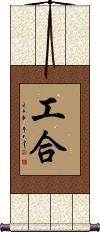Many custom options...
And formats...

Gung Ho in Chinese / Japanese...
Buy a Gung Ho calligraphy wall scroll here!
Gung Ho
Working Together
工合 is one of those Asian words that is used more in English than in the original Chinese.
Gung Ho was originally used to speak of Carlson's Raiders, a group of “Gung Ho” U.S. Marines who went on an island-hopping campaign of death during WWII.
A movie called Gung Ho came out in the mid-1940s and was later re-released in the 1950s depicting the 2nd Marine Raider Battalion, and brought this word to the mainstream.
It is still sometimes used today within the U.S. Marine Corps brotherhood to refer to a unit or group that works well together or is otherwise efficient and motivated (has good morals).
In 1986, there was a movie called Gung Ho about a Japanese company taking over an American automotive factory. They completely ignored the fact that this was a Chinese title.
It should be noted that this title actually means a condition, state, manner, or the health of something in Japanese.
Language and pronunciation notes:
Like many Asian words absorbed into common use in English, this one is drastically mispronounced. The official Romanization is “gong he” but that doesn't tell you enough. The vowel sound on the first character is like the English word “own,” now just add the g-sounds to the beginning and end. The second character is misleading, as you might think it is like the English word “he.” In reality, the vowel sound is more like the “u” in “up.”
It should also be noted that the current generation in China no longer uses or recognizes this as a common word or slogan.
Note: This can be pronounced and is a word in Japanese, though seldom used. Japanese will use a variation of "具合" instead. But still, not common.
Not the results for Gung Ho that you were looking for?
Below are some entries from our dictionary that may match your Gung Ho search...
| Characters If shown, 2nd row is Simp. Chinese |
Pronunciation Romanization |
Simple Dictionary Definition |
カンボー see styles |
ganhoo ガンホー |
gung-ho; (personal name) Cambo |
猛烈社員 see styles |
mouretsushain / moretsushain もうれつしゃいん |
(yoji) gung-ho organization (corporate) man (woman); go-getter worker; hard-driving worker; workaholic employee |
モーレツ社員 see styles |
mooretsushain モーレツしゃいん |
(yoji) gung-ho organization (corporate) man (woman); go-getter worker; hard-driving worker; workaholic employee |
The following table may be helpful for those studying Chinese or Japanese...
| Title | Characters | Romaji (Romanized Japanese) | Various forms of Romanized Chinese | |
| Gung Ho | 工合 | guai | gōng hé / gong1 he2 / gong he / gonghe | kung ho / kungho |
Successful Chinese Character and Japanese Kanji calligraphy searches within the last few hours...




